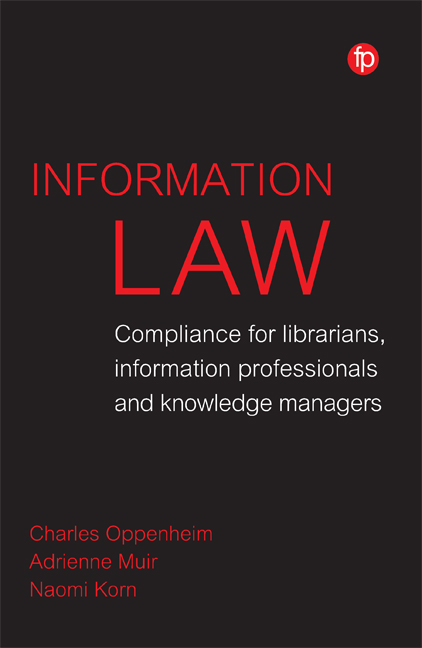Book contents
- Frontamtter
- Contents
- List of Acronyms
- List of Figures and Tables
- List of Case Studies
- Introduction
- 1 Copyright and Related Rights
- 2 Data Protection
- 3 Freedom of Information
- 4 Governance, Audits and Risk Assessment
- 5 Policies
- 6 Procedures: Copyright and Related Rights
- 7 Procedures: Using and Negotiating Licences for Access to Information Resources
- 8 Procedures: Data Protection and Freedom of Information
- 9 Tools and Templates
- 10 Awareness and Engagement
- 11 Some Speculations About the Future
- Appendix 1 Carrying out an Information Asset Audit
- Appendix 2 Sample IP Policy
- Appendix 3 Sample Data Protection Policy
- Appendix 4 Possible Contractual Terms for Online Access to Database Service
- Appendix 5 Data Protection Privacy Notice Template
- Bibliography
- Index
9 - Tools and Templates
Published online by Cambridge University Press: 29 July 2020
- Frontamtter
- Contents
- List of Acronyms
- List of Figures and Tables
- List of Case Studies
- Introduction
- 1 Copyright and Related Rights
- 2 Data Protection
- 3 Freedom of Information
- 4 Governance, Audits and Risk Assessment
- 5 Policies
- 6 Procedures: Copyright and Related Rights
- 7 Procedures: Using and Negotiating Licences for Access to Information Resources
- 8 Procedures: Data Protection and Freedom of Information
- 9 Tools and Templates
- 10 Awareness and Engagement
- 11 Some Speculations About the Future
- Appendix 1 Carrying out an Information Asset Audit
- Appendix 2 Sample IP Policy
- Appendix 3 Sample Data Protection Policy
- Appendix 4 Possible Contractual Terms for Online Access to Database Service
- Appendix 5 Data Protection Privacy Notice Template
- Bibliography
- Index
Summary
Introduction
Organisations drawing up procedures to implement information policies can make use of various sources of guidance, tools, and pro-formas. The main source of authoritative and detailed guidance on data protection and FoI is the Information Commissioner's Office (ICO). The Scottish Information Commissioner also provides FoI advice and toolkits for public authorities and other organisations subject to FoI in Scotland. The UK IPO provides some information and guidance on rights management, but little in the way of tools or templates to support this. Other sources of guidance on copyright and licensing include Jisc, which supports the higher and further education sectors in the UK in licensing and managing information resources. CopyrightUser.org provides advice on using copyright works for rights holders as well as copyright users, including libraries and archives. This chapter introduces sources of advice to help organisations comply with information laws and manage their own, and others’ intellectual property appropriately. It also introduces toolkits and templates that organisations and LIK services can use in the development and implementation of their procedures.
Copyright and licensing agreements
Contractual arrangements are the main basis of intellectual property rights (IPR) management in organisations, including libraries and archives. As far as an organisation's own IPR are concerned, standard agreements can be drawn up to ensure the organisation owns rights in accordance with its policies. They can be effected through standard employment terms and other standardised contractual arrangements with service providers and independent consultants. The organisation's legal experts will normally draw up such standard agreements, but it is important to ensure that there is some flexibility to reflect the organisation's values and the different relations hips it has with its stakeholders, so ensuring that the standardised agreements are fit for purpose and that each party gets what they need from the agreement.
LIK services are more concerned with the use of copyright works in their collections, including reprographic copying and scanning.
- Type
- Chapter
- Information
- Information LawCompliance for Librarians, Information Professionals and Knowledge Managers, pp. 123 - 140Publisher: FacetPrint publication year: 2020

